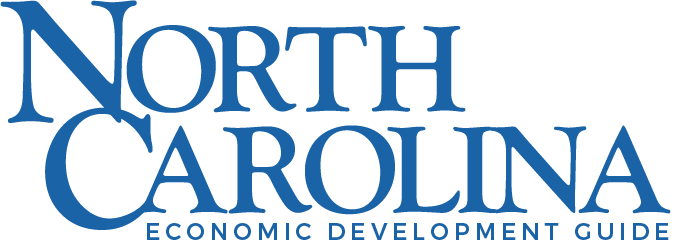Icing on the cake
North Carolina stays competitive in providing incentives to companies seeking that extra edge as they expand or relocate.
By David Dykes
Cities and states offer billions in tax breaks to keep or attract employers and protect or lure jobs. It often means local governments just miles apart are pitted against each other with bundles of incentives. While the case is no different in North Carolina, site selectors and others say the state has the work culture, educational systems and other tools to ensure continued success.
Labor needs are critical for many companies that employ esrp, a Frisco, Texas-based commercial real-estate firm that advises businesses considering expansions or headquarters moves, says Susan Arledge, president of site-selection services. “[Clients] are looking for us to tell them where can we find not just affordable labor but sustainable labor, qualify workforce and the ability for retention,” she says. “When we compare labor costs, we’re not just looking at what it costs to hire that person, but how affordable is it to live in that market when they are hired? And that is an area where the Carolinas fare very well.”
North Carolina’s economic-development efforts face a strong competitor from its southern neighbor. South Carolina expanded the list of business activities that may qualify for the state’s Job Development Credit to include legal, accounting, banking or investment services. S.C. lawmakers also added a tax credit for entities that increase annual purchases of agricultural products certified as South Carolina-grown. Moreover, South Carolina continually offers incentives to lure Charlotte companies across the state line.
But Tar Heel officials aren’t intimidated. “North Carolina doesn’t really try to match competing states on a dollar-by-dollar basis through cash incentives largely because we don’t have to,” says Mark Pope, president of the N.C. Economic Developers Association and director of the Wayne County Development Alliance in Goldsboro. “Our natural and man-made advantages — mid-Atlantic location, great roads, exceptional universities and community colleges, growing population and appealing quality of life — keep our competitive edge sharp. Not every state can match us on that level. For most projects we see, incentives are icing on the cake — not the meal itself.”
Providing incentives can be especially important to attract companies to rural areas, which are often in the greatest need of economic stimulus.
Unfortunately, projects in the less-populated regions tend to be less successful in living up to their promises of job creation, investment or wages than those in urban markets, according to a 2015 study of the JDIG program by Allan Freyer, director of the Workers’ Rights Project at the North Carolina Justice Center in Raleigh. Incentive grants should go to firms in targeted industries poised for robust growth rather than those in decline, and grants should be designed to bring infrastructure development and job training resources to needy rural counties, Freyer says.
State Sen. Rick Gunn, a Burlington Republican who focuses on economic development, says the state is making progress in rural development with a multipronged approach, including an emphasis on infrastructure improvements. “We are nowhere near where we need to be and where we think we can go,” he says. “But I think the general consensus is there is a heightened awareness of the challenges that we have in our rural communities.”
OPEN FOR BUSINESS
North Carolina is a great place to establish or grow your business. Recent economic-development announcements include:
ALLSTATE INSURANCE, Northbrook, Ill.
NEW JOBS: 2,250
COUNTY: Mecklenburg
PROJECTED INVESTMENT: $22.6m
N.C. INCENTIVES: $17.9m
Allstate joins Axa and Brighthouse Financial among insurance companies recently adding jobs in the Charlotte region. The expansion of an operations center will more than double its regional employment of about 1,400. With 2017 revenue of $38.5 billion, Allstate is the largest publicly held U.S. personal-lines insurer.
LABCORP, Burlington
NEW JOBS: 422
COUNTY: Durham
PROJECTED INVESTMENT: $30M
N.C. INCENTIVES: $8.2m
The medical-testing company with a market cap topping $16 billion has expanded aggressively through acquisitions, adding services beyond diagnostics. Jobs at a new Research Triangle Park facility will include information-technology designers, software developers, operations staff and managers. LabCorp employs more than 60,000 people worldwide, including more than 8,900 in the state.
FRESENIUS KABI, Bad Homburg, Germany
NEW JOBS: 445
COUNTY: Wilson
PROJECTED INVESTMENT: $150m
N.C. INCENTIVES: $7.2M
The German drugmaker is building a plant to produce prefilled syringes for a variety of conditions, a market that is expected to top $6 billion by 2020. The average annual salary for the new jobs will be about $60,000, including benefits. Fresenius first came to North Carolina through its 2016 acquisition of Becton Dickinson & Co.’s prescription-drug business.
CORNING, Corning, N.Y.
NEW JOBS: 428
COUNTIES: Durham (317 jobs), Edgecombe (111 jobs)
PROJECTED INVESTMENT: $275M
($189 million in Durham and $86 million in Edgecombe)
N.C. INCENTIVES: $4.5m
With more than 4,000 employees in the state, Corning has been one of North Carolina’s most active job creators in recent years. A new Durham plant will make Valor Glass, a damage-resistant product used to make medicine containers, a result of a collaboration with drugmakers Merck and Pfizer. In addition, the company will build a warehouse in Tarboro adjacent to the 1,449-acre Kingsboro Megasite.
EY, London
NEW JOBS: 375
COUNTY: Mecklenburg
PROJECTED INVESTMENT: $8.2m
N.C. INCENTIVES: $3.2M
The professional-services firm formerly known as Ernst & Young is establishing an innovation center with a focus on financial services and energy. The company operates more than a dozen similar “wavespace” centers globally. Average annual salary for the new jobs will be $74,926. The third-largest accounting firm in the world has more than 1,300 employees in North Carolina.
DISCRETIONARY GRANTS
Job Development Investment Grants provide performance-based incentives directly to new and expanding businesses to help offset the cost of establishing or expanding in the state.
The One North Carolina Fund is another incentive program that awards cash grants based on the number of jobs created, amount of investment, location and expected economic impact.
In 2018, legislators approved a Transformative Project provision of the JDIG grant program. To qualify, companies must create at least 3,000 jobs and invest at least $1 billion within 10 years.
Other programs include Building Demolition and Building Reuse grants that provide funds for site rehabilitation and renovation of vacant industrial and commercial buildings.

